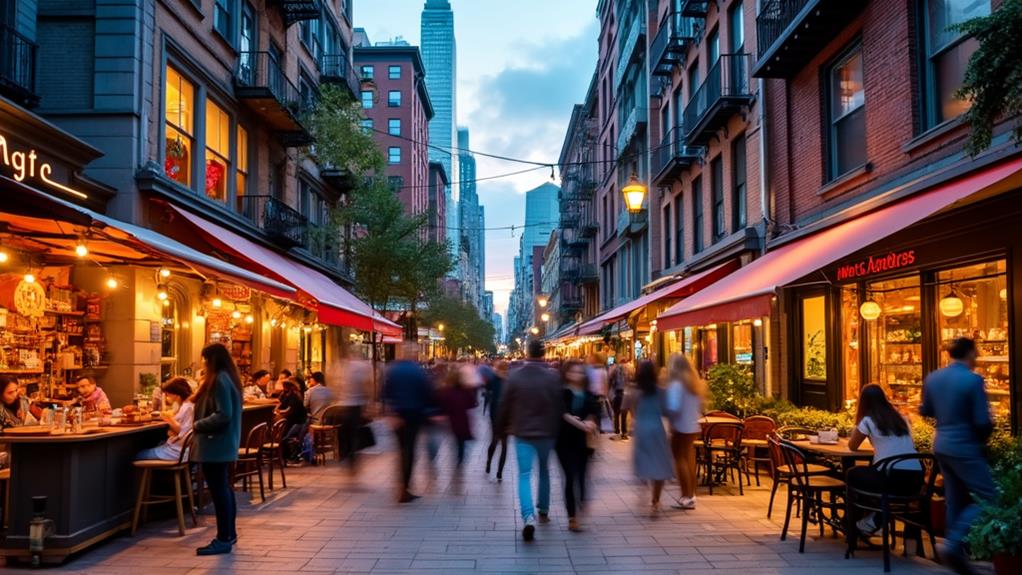Urban environments offer a fertile ground for small business success, driven by evolving consumer preferences and emerging market trends. Technology-driven services, such as app development and tech support, are thriving, supported by the forecasted technology market growth to over $1 trillion by 2025. Eco-friendly ventures gain momentum, with a notable increase in demand for sustainable products and services. Innovations in food and beverage, including specialty coffee shops and meal prep services, align with urban lifestyles. Convenience retail amplifies efficiency with 24-hour models and click-and-collect. Similarly, the fitness industry expands through boutique studios and health-focused offerings. Explore these pathways for potential opportunities.
Table of Contents
ToggleTechnology-Driven Services
In an era where digital innovation shapes the urban landscape, technology-driven service businesses have become indispensable to city life. The IT and software development market is set to surpass $1 trillion by 2025, driven by increasing reliance on digital solutions.
With over 80% of urban residents owning smartphones, there is a significant boost in app development, catering to diverse consumer needs. E-commerce is another booming sector, with sales expected to reach $6.54 trillion globally by 2023.
The flexible workspace market, projected to grow to $300 billion by 2030, reflects the shift towards remote work. Additionally, the demand for tech support services rises in tandem with mobile device dependency, underscoring the critical role of technology in modern urban environments.
Eco-Friendly Ventures
Driven by growing consumer consciousness and environmental concerns, eco-friendly ventures are rapidly emerging as viable and profitable business opportunities.
The global market for sustainable products is projected to reach $150 billion, reflecting the increasing demand for environmentally responsible brands. With 66% of consumers willing to pay a premium for such products, businesses focusing on green solutions are poised for success.
Zero-waste practices, supported by 72% of millennials, further underscore the trend towards sustainability. Urban areas are seeing a significant rise in community-supported agriculture and urban farms, enhancing food security while promoting local produce.
Additionally, eco-friendly cleaning services are experiencing a 10% annual growth rate, as more consumers seek sustainable alternatives in their daily lives, reinforcing the viability of eco-conscious enterprises.
Food and Beverage Innovations
The food and beverage industry is undergoing significant transformation as urban consumers increasingly seek innovative dining experiences and health-conscious options. This shift has led to the emergence of specialized food and beverage concepts catering to diverse consumer preferences.
Specialty coffee shops, for instance, capitalize on the demand for high-quality, premium brews, attracting discerning coffee aficionados. Artisanal bakeries are gaining traction by offering unique, handcrafted goods, appealing to consumers' desire for authenticity and craftsmanship.
In addition, the growth of food trucks, projected to generate $1.1 billion by 2024, highlights the urban appetite for diverse culinary options. Meal prep services and health-focused cafes are also flourishing, aligning with the wellness trend, as urbanites prioritize convenience and nutrition in their busy lifestyles.
Convenience Retail Opportunities
As urban consumers embrace innovative dining and health-conscious trends, a parallel evolution is occurring in the domain of convenience retail. The demand for 24-hour convenience stores has surged, with 30% of consumers favoring non-traditional shopping hours.
This shift aligns with the growing preference for click and collect services, which enhance the urban shopping experience by offering efficiency and flexibility. Additionally, specialty grocery stores focusing on local products are thriving, reflecting an increased emphasis on health consciousness.
The organic food market, projected to reach $99 billion in the U.S. by 2025, underscores this trend. Retailers prioritizing location convenience are also gaining traction, as 70% of urban shoppers select retail sites based on proximity, highlighting the significance of accessible, tailored retail solutions.
Wellness and Fitness Trends
Amidst the bustling urban landscape, wellness and fitness trends are reshaping how city dwellers approach health. The fitness services market is projected to reach $87 billion by 2023, highlighting a significant demand for personalized wellness solutions.
Boutique fitness studios are gaining popularity, offering tailored workout experiences that cater to individual preferences. Health food stores are thriving, driven by a growing interest in organic and health-conscious options.
Innovative wellness services, such as group classes, tap into the need for community support and engagement. With 83% of Americans acknowledging the importance of regular exercise, urban entrepreneurs have a unique opportunity to capitalize on these trends by establishing businesses that prioritize health, wellbeing, and community-driven fitness experiences.


